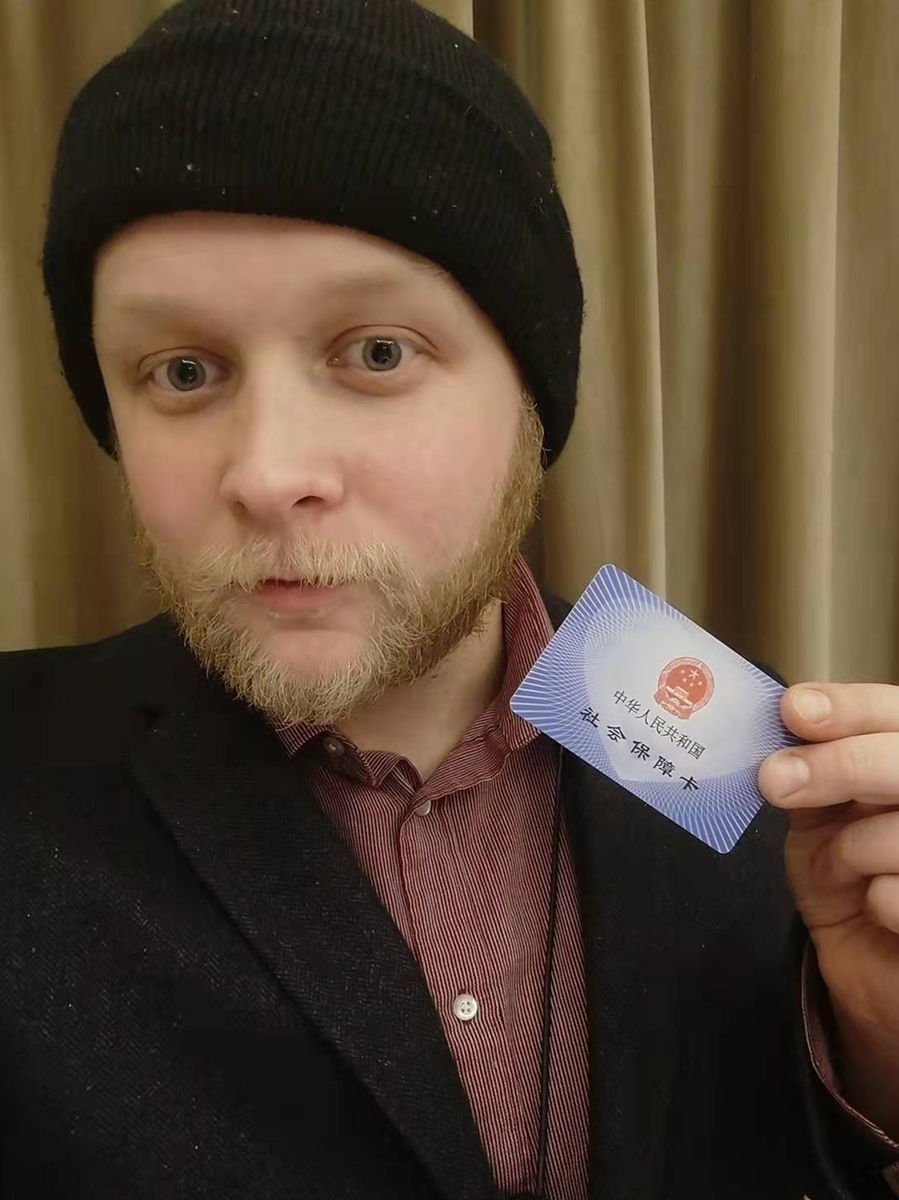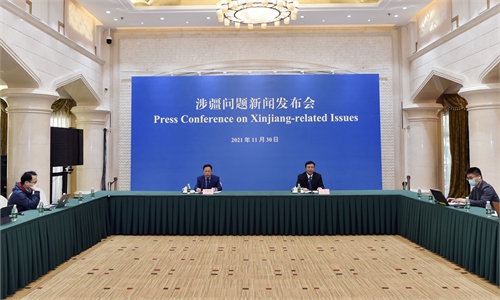IN-DEPTH / IN-DEPTH
British blogger’s prank shows how little West’s ‘China experts’ really know about China

Curt McArdle holding his social security card Photo: Courtesy of McArdle
Do people who continue issuing China-related threats in TV interviews or write commentary to promote anti-China sentiments, or give advices to Western governments on China policies really know anything about China? Or at least know how to understand information on China that is in Chinese?
The answer seems to be a resounding "No" as demonstrated by a recent "prank" by a British YouTuber, Curt McArdle, who lives in China. McArdle duped three "prominent" China experts into believing that a card with bold Chinese characters translated to "social security card" written on it was a "positive content payment card" from the Chinese government. McArdle shared the story on why and how he orchestrated the prank in a video and uploaded it online which later sparked heated discussions in China and abroad.
"Never in a million years did I think anyone who claims to be a 'so called' expert would fall for something as simple as this. It's actually terrifying that these people are impacting discourse on China in the West, and are impacting policies that the likes of the UK put in place when it comes to China, McArdle told the Global Times in an exclusive interview.
As a YouTuber, McArdle usually uploads videos of his trips in China on social media which have incurred criticism, with some labeling him a "Wumao" - "50 cents"- a term that some anti-China forces use for people who make positive comments on China, the Chinese government or the Communist Party of China (CPC). In recent times, the term has also been used by some foreign media outlets to describe some foreign bloggers who upload videos to share their stories about China.
As one of the foreigners being smeared and attacked online, McArdle decided to fight back with a prank - he left messages for some social media accounts that usually engage in disinformation about China, in which he pretended to be hired by the Chinese government and sent a picture of a social security card in China with the message, "Hi mate, I'm still using the same 'positive content payment card' I got at our last meeting but I haven't been paid this month. Let me know what I can do to fix it." He continued to write that he had sent the message to the wrong person and inquired how to delete the message.
Although the Chinese characters of "Social Security Card" are so boldly printed on the card, anyone with any level of proficiency in Chinese would understand that it has nothing to do with bank accounts but can be used for medical and elderly insurance; some people have been fooled and caught flat-footed.
Luke de Pulford, who claimed to be a human rights campaigner in the UK, particularly "in the areas of modern slavery and human rights abuses in China" reposted a screen shot that showed McArdle's messages and commented, "Is this… for real?" Magnus Fiskesjö, who claims to be a teacher from the Cornell University and whose research concerns ethnic relations and political anthropology in China and Southeast Asia, commented, "How pro-regime trolls get paid." And Solomon Yue, a Chinese American Republican Party activitist, also posted the screenshot of McArdle's message and later made several posts to mock McArdle.
By reading their bios on social media accounts and public information, the Global Times found that these individuals have been deeply involved in topics concerning China, especially on Xinjiang and Hong Kong. Pulford, for example, advises the World Uyghur Congress, a US-backed organization that is seeking for the fall of the Chinese government. He also coordinates the Inter-Parliamentary Alliance on China, pressuring parliaments and politicians to take tougher stances against China. Since 2019, he has emerged as an adviser to "democracy activists" in Hong Kong and British MPs who are critical of the CPC.
Seeing these people get duped by such a simple trick made McArdle laugh for a whole day.
"I thought they would be smart enough to not fall for it. But they are just so desperate to find something to hold on to and did not do any research… We've got people who work with the British government, we've got university lecturers who teach about China to people… It's crazy to see that these people would fall for something like that," McArdle said.
These are the experts who ironically know nothing about life in China. Anyone who is an expert on a country should at least be able to read the language and it's really concerning that these are the amplified voices on China and these are the people that the BBC and the New York Times, and CNN will speak to and will quote from, McArdle said.
"My gut instinct has always been that these people don't even really believe the things they say. They are opportunists who capitalize on people's ignorance to make a bit of money."
He shared this story on a video and uploaded it on his YouTube account on January 18. As of press time, the video has received more than 12,000 views and attracted lots of attention in China and beyond. A netizen commented that this is a great video and, "This is exactly the situation: Those who call themselves China experts take any negative 'evidence' and broadcast it. It doesn't matter whether it is true or not. By the way, most of these experts haven't even been in China for years!"
Despite the discussions over the incident, none of the above "China experts" contacted McArdle.
"I'm always happy for a debate with people, so it's a pity that they didn't feel comfortable doing so. I think they would rather just pretend it didn't happen," said McArdle.
"They became the targets of ridicule from Chinese people all over the country and around the world. I've had so many lovely messages, too many to count, thanking me for proving what these people really are. I think these experts want to forget this incident happened and continue with pushing their anti-China rhetoric. I just hope that, if anyone ever sees a friend or family member falling for their propaganda, you remind them that they can't even recognize a card that almost everyone in China carries!"
McArdle said that there was an interesting contrast between the responses from Chinese fans and Western fans when it came to the "duping" video.
"My Chinese fans just laughed, because they knew that these people were not the experts they claim to be, and were happy to have some evidence of that. But my Western fans were quite shocked, because they were led to believe that these people should be trusted. They work for our governments, or our major universities. They dictate the relationship between China and the UK, or train the next generation of policy makers on China. I think they are actually quite concerned at how little these people know, compared to how much power they have," said McArdle.
This joke is nothing surprising as it exposed the most typical rhetoric that these so-called Western "China experts" have used to smear China, Lü Xiang, a research fellow at the Chinese Academy of Social Sciences, told the Global Times.
Despite being well-educated, some Western politicians, media professionals, and scholars turned out to be gullible and histrionic when faced with China-related issues. They act like headless chicken running around spreading any anti-China rumors without double checking the information, Lü said.
It's a sign that the political landscape in the US and some other Western countries and regions has sunk into the quagmire, from which no one can get out, Lü pointed out. And what the "China experts" do is to drag China into the same quagmire rather than lift themselves out of it, Lü said.
Shen Yi, a professor at the School of International Relations and Public Affairs at Fudan University, pointed out that the joke made us question the quality of these so-called overseas "China experts." The ultimate goal of these "China experts" is not to attack China, but instead, anti-China issues are a profit-making avenue for them.
Citing the popular saying that some Western forces usually use, "All the problems in China are rooted in the system," Shen said in a tit-for-tat way, the joke reflected that the problem is indeed rooted in the US and its partners.
The elected politicians and the welcomed opinion leaders in their countries are merely slick talkers, Shen said. And they have conducted themselves foolishly not only on China-related issues but also on their domestic policies, Shen noted. "The foolish perform consistently on every issue," Shen said.




